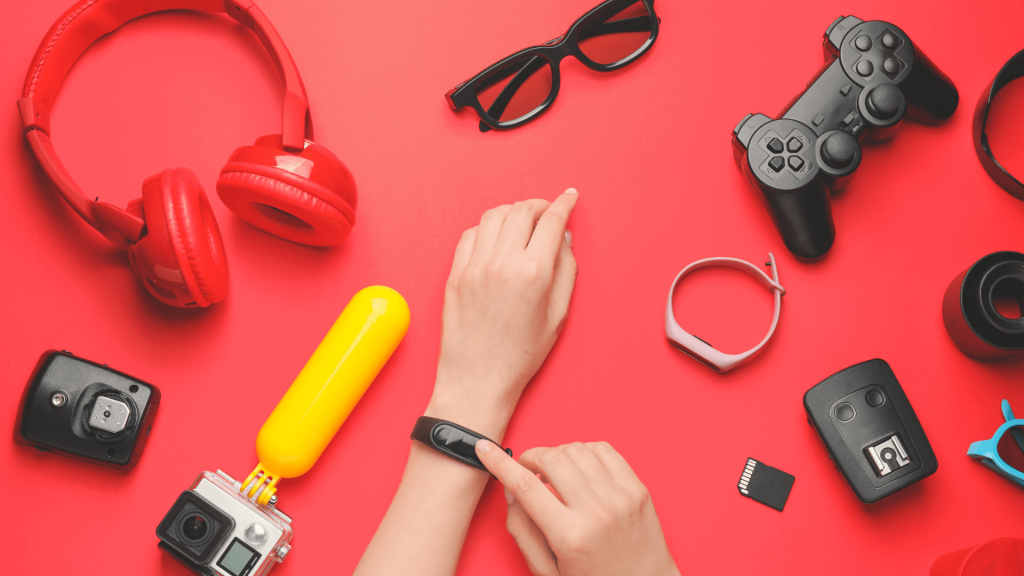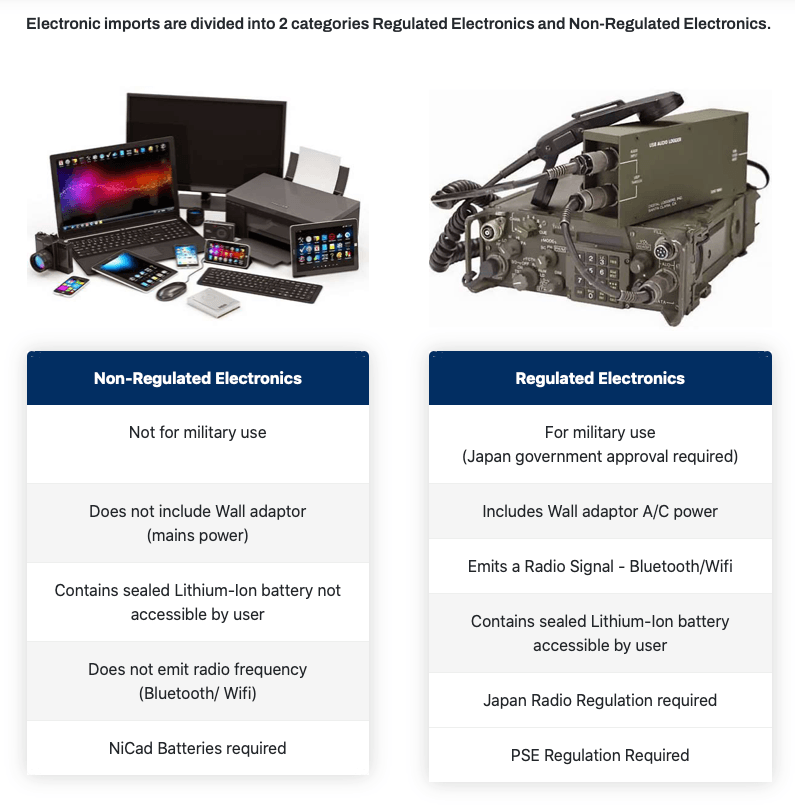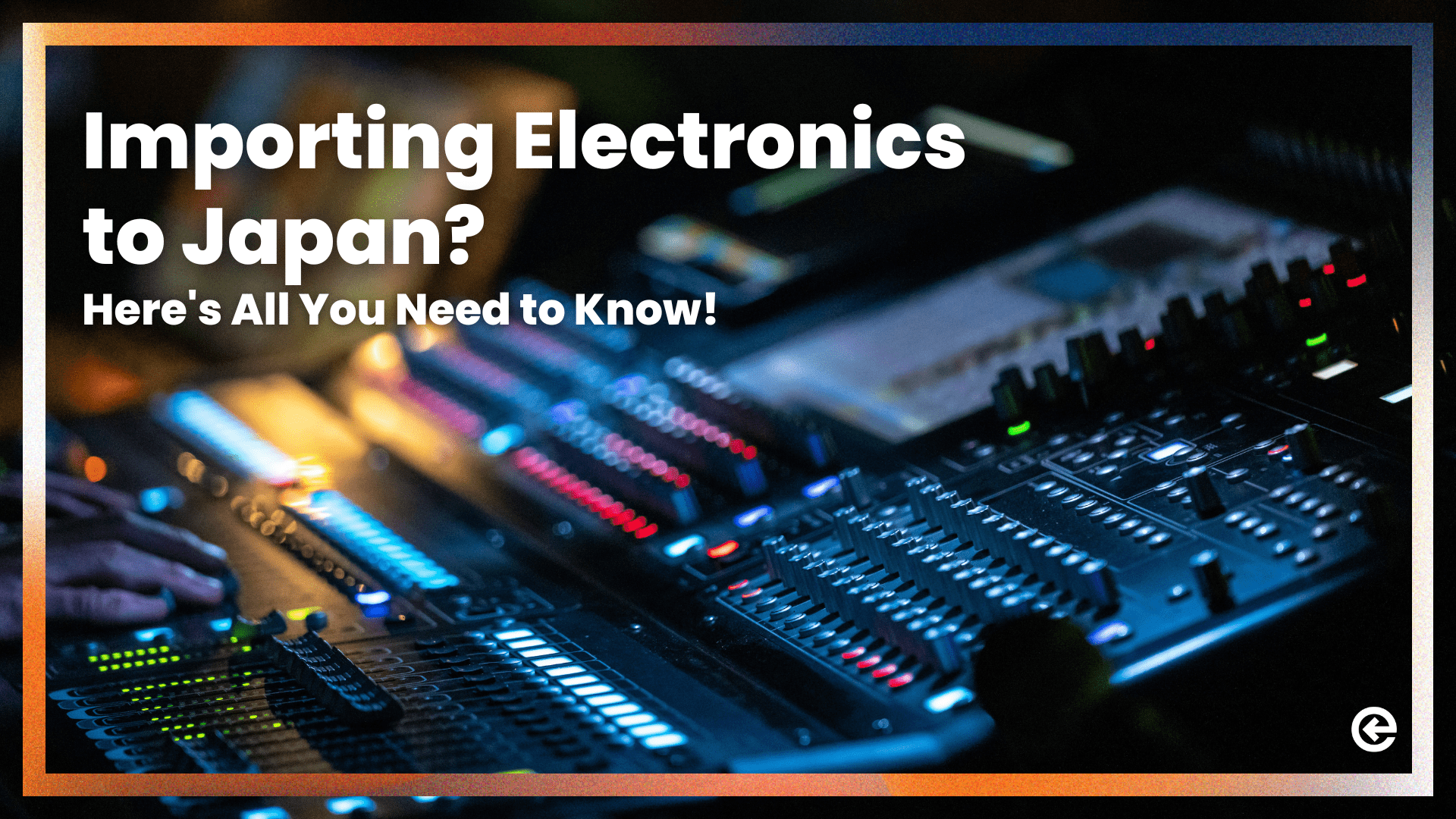Importing Electronics to Japan? Here’s All You Need to Know!
Japan is a technology-driven nation with a high demand for electronics. The country’s electronics market is one of the largest in the world, with an estimated value of over US36.99bn in 2023.
In 2022, US120.09bn worth of imports was alone under the electronics category.

As a foreign business looking to import electronics to Japan, there are several challenges you may encounter.
Here’s a guide for importing electronics in Japan.
Two Types of Regulation for Importing Electronics into Japan

There are two crucial categories for regulated electronics when importing to Japan:
1- Japan PSE
PSE is a safety standard for electronic products. PSE stands for Product Safety Electrical Appliance & Material and is enforced by the Japanese government through the Electrical Appliance and Material Safety Law (DENAN). The PSE Mark is a mandatory safety label for products that connect to main power (A/C – wall power) or have a user-accessible Lithium-Ion battery.
Products must comply with this standard to be sold in Japan. The certification process involves testing for electrical safety, electromagnetic compatibility, and other safety requirements. The PSE mark is mandatory for importers who want to sell their electronic products in Japan.
Products subject to Japan PSE are divided into two categories:
Regulated Electronic Products (high-risk) and Non-regulated Electronic Products (low-risk).
Non-regulated products are subject to a self-declaration scheme and require the PSE Circle Mark, while regulated products require third-party assessment and display of the PSE Diamond Mark. Nearly all electronic consumer products sold in Japan need PSE marking.
Non-Regulated Electrical Products (low-risk):
– Extension cords
– Battery chargers for mobile phones or laptops
– LED light bulbs
– Computer keyboards or mice
– USB cables and more
Regulated Electrical Products (high-risk):
– Hair dryers or straighteners
– Electric kettles or rice cookers
– Microwave ovens
– Electric shavers or toothbrushes
– Lithium-ion batteries for electric vehicles and more
2- Japan Radio
The Japan Radio Law covers all products that use the radio spectrum and operate under 3 THz, including those that are not radio communication devices. Any product that emits a radio wave (e.g., GPS, WiFi, Bluetooth) is subject to the law, while those that only receive a GPS signal are not. It’s imperative to note that even non-communication devices, such as discharge lamps and induction heating devices, might be subject to Japan Radio.
Products under Japan Radio:
– Mobile phones with WiFi, Bluetooth, or GPS capabilities
– Wireless earbuds
– WiFi routers or modems
– Bluetooth speakers
– Smartwatches with cellular connectivity and more
Read more on Japan Radio Law.
Process of Importing Electronics in Japan
Step 1: Choose an Importer of Record
Finding a reliable individual or company as an Importer of Record with experience importing electronic products into Japan is crucial. Your local partner should thoroughly understand Japanese regulations to ensure a smooth and successful import process.
Step 2: Determine if your electrical products can be imported into Japan
Familiarizing yourself with import requirements and documentation is important to avoid delays or additional costs. For electronic products, certain technical standards regarding performance, durability, and safety must be met to qualify for import into Japan. You can find them in the Electrical Appliance and Material Safety Law (DENAN).
Electronic products must undergo a safety assessment when subject to Japan Radio and/or Japan PSE to comply with the regulations. That includes testing and inspection of components. Japan PSE testing is usually carried out in testing and inspection facilities designated by the Ministry of Health, Labour, and Welfare (MHLW).
Step 3: Submit the necessary documentation for product registration
Product import declarations include:
– Invoices
– Bills of lading or airway bills
– Certificates of origin
– Packing lists
Additional documents if your products fall under Japan Radio:
– Manufacturer Japan Radio Certification: The manufacturer must obtain Japan Radio certification for their manufacturing facility from an internationally recognized certification company (such as TÜV Rheinland). Note that this certification is not a license to import but is the first requirement in the application process. Be sure to request a certified copy of the certificate from the issuing company.
Additional documents if your products fall under Japan PSE:
– Manufacturer PSE Certification: The manufacturer must obtain a Japan PSE certification for their manufacturing facility from an internationally recognized certification company (such as TUV Rheinland). Note that this certification is not a license to import but is the first requirement of the application process. Request a certified copy of the manufacturer’s PSE certification from the issuing company.
– PSE testing results if conducted before shipping.
Providing all necessary documentation and certifications ensures a successful and hassle-free import process into Japan.
Step 4: Product Label if it falls under Japan PSE or Japan Radio
For Japan Radio:
1- The Japan Radio Label must be affixed to the product before shipping.
2- The label must include the Importer of Record’s information, the Japan Radio Mark, and the license number.
3- The label must be in Japanese.
For Japan PSE:
1- Every product or part subject to Japan PSE requires a Japan PSE Label before shipping.
2- The label must include the Importer of Record’s information and the PSE mark.
3- If no label is affixed before shipping, the product or part will be held in customs until a label is applied.
By following these labeling requirements, you can ensure compliance with Japanese regulations and avoid customs issues.
Step 5: Import Application
Your Importer of Record (IOR) company will handle the application process and forwards registration for your product to MHLW. Once the product has been approved for import, it can be sent to Japan, where the importer will handle customs clearance.
Conclusion
You can streamline the import process by working with an experienced IOR company and ensuring your products meet all the requirements. That helps your electronic products to enter the Japanese market successfully without delays or hurdles at customs.
Ready to Get Started?
As your Importer of Record and local partner, COVUE helps you import your electronic products into Japan. Whether your products are unregulated, regulated, or subject to Japan Radio/Japan PSE, we know how to get the documentation and processes in order to expand your business.
Sources: https://www.certification-japan.com ; https://www.jqa.jp ; https://www.certification-japan.com; https://tradingeconomics.com; https://www.statista.com


